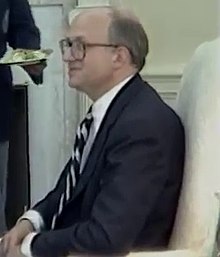Our website is made possible by displaying online advertisements to our visitors.
Please consider supporting us by disabling your ad blocker.
Martin Feldstein
Martin Feldstein | |
|---|---|
 Feldstein at the White House in 1982. | |
| 13th Chair of the Council of Economic Advisers | |
| In office October 14, 1982 – July 10, 1984 | |
| President | Ronald Reagan |
| Preceded by | Murray Weidenbaum |
| Succeeded by | Beryl Sprinkel |
| Personal details | |
| Born | Martin Stuart Feldstein November 25, 1939 New York City, U.S. |
| Died | June 11, 2019 (aged 79) Boston, Massachusetts, U.S. |
| Political party | Republican |
| Education | Harvard University (BA) Nuffield College, Oxford (BLitt, MA, DPhil) |
| Academic career | |
| Field | Macroeconomics, public economics |
| Institution | Harvard University (1967–2019) National Bureau of Economic Research (1977–1982, 1984–2019) |
| School or tradition | Neoclassical economics |
| Doctoral advisor | W. M. Gorman |
| Doctoral students | Harvey S. Rosen Eli Noam[1] Larry Summers Jeffrey Sachs[2] Joel Slemrod Douglas Elmendorf Jeffrey Liebman Raj Chetty[3] |
| Contributions | Feldstein-Horioka puzzle |
| Awards | John Bates Clark Medal (1977) |
| Information at IDEAS / RePEc | |
Martin Stuart Feldstein (/ˈfɛldstaɪn/ FELD-styne;[4] November 25, 1939 – June 11, 2019) was an American economist.[5] He was the George F. Baker Professor of Economics at Harvard University and the president emeritus of the National Bureau of Economic Research (NBER). He served as president and chief executive officer of the NBER from 1978 to 2008 (with the exception of 1982 to 1984).[6] From 1982 to 1984, Feldstein served as chairman of the Council of Economic Advisers and as chief economic advisor to President Ronald Reagan (where his deficit hawk views clashed with the Reagan administration's large military expenditure policies). Feldstein was also a member of the Washington-based financial advisory body the Group of Thirty from 2003.[7]
- ^ "Eli M. Noam". Columbia Institute for Tele-Information. Archived from the original on October 11, 2016. Retrieved October 16, 2016.
- ^ "Sachs's CV" (PDF). Archived from the original (PDF) on March 5, 2017. Retrieved October 12, 2016.
- ^ Chetty, Nadarajan. "Consumption commitments, risk preferences, and optimal unemployment insurance". Retrieved January 23, 2014 – via ProQuest.
- ^ Safire, William (December 25, 1983). "On Language; Stine or Steen?". The New York Times.
- ^ "Obituary: Martin S. Feldstein". The Boston Globe. Boston. June 11, 2019. Retrieved June 11, 2019.
- ^ "Martin Feldstein". www.nber.org. Retrieved November 21, 2017.
- ^ "MARTIN FELDSTEIN Obituary (2019) – Belmont, MA – Boston Globe". Legacy.com.
Previous Page Next Page


